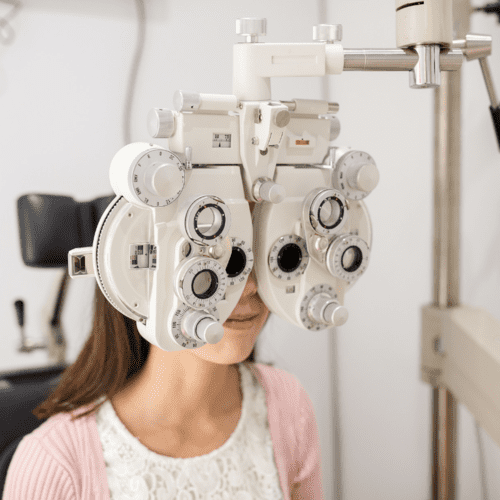Diabetes is a condition that affects multiple systems in the body, including your eyes. One of the most significant risks for diabetics is the potential for developing serious eye conditions that can lead to vision loss or blindness if left untreated. For this reason, regular eye exams are essential for anyone with diabetes, as they help detect early signs of complications and protect your vision.
How Nassau County Opticians Help Manage Diabetic Eye Health
Regular eye exams are the first line of defense against diabetic eye diseases. Opticians in Nassau County are highly trained in detecting the early signs of these conditions, allowing for timely intervention that can prevent vision loss and improve eye health.
Here’s how your local optician can help manage your eye health if you have diabetes:
1. Comprehensive Eye Exams
During a comprehensive eye exam, your optician will perform a range of tests to assess the health of your eyes and detect any signs of diabetic complications. These tests typically include:
- Visual acuity test: Measures how well you see at different distances.
- Dilated eye exam: Your optician will use eye drops to dilate (widen) your pupils, allowing them to get a clear view of the retina and detect any damage to the blood vessels or signs of diabetic retinopathy.
- Tonometry test: Measures the pressure inside your eyes to check for glaucoma.
- Optical coherence tomography (OCT): A non-invasive imaging test that provides detailed cross-sectional images of the retina, helping to detect any swelling or abnormalities.
2. Early Detection of Diabetic Eye Diseases
One of the key benefits of seeing an optician regularly is the ability to catch eye problems early, often before you notice any symptoms. Early detection of conditions like diabetic retinopathy, DME, and glaucoma allows for treatments that can slow or stop the progression of these diseases, preserving your vision.
3. Personalized Eye Care and Treatment
If your optician detects any signs of diabetic eye disease, they will work with you to develop a personalized treatment plan.
- Laser therapy: Used to seal or shrink leaking blood vessels in the retina, preventing further damage.
- Injections: Medications can be injected into the eye to reduce swelling and prevent fluid buildup in cases of DME.
- Surgery: In advanced cases, surgery may be necessary to restore vision.
Your optician will also coordinate care with your primary doctor or endocrinologist to ensure that your diabetes is being managed in a way that supports your overall eye health.
4. Ongoing Monitoring
Eye health for diabetics isn’t a one-time concern; it requires ongoing monitoring. Your optician will recommend regular follow-up exams to monitor any changes in your vision and catch any new or recurring issues early.
In Nassau County, opticians often suggest that diabetics have an eye exam at least once a year. However, if you are at higher risk or already have signs of diabetic retinopathy, more frequent exams may be necessary.
Protecting Your Eyes from Diabetic Complications
Along with regular eye exams, there are several steps you can take to protect your eyes and reduce the risk of complications related to diabetes:
- Control your blood sugar levels: Keeping your blood sugar levels in the target range can slow the progression of diabetic retinopathy and reduce your risk of developing other eye conditions.
- Monitor your blood pressure: High blood pressure can worsen eye damage, so it’s essential to keep it under control.
- Quit smoking: Smoking increases your risk of developing diabetic complications, including eye diseases.
- Wear sunglasses: Protect your eyes from harmful UV rays, which can contribute to cataracts and other eye problems.
- Eat a healthy diet: Nutrients like vitamin C, vitamin E, and omega-3 fatty acids can help maintain eye health.
Conclusion
For individuals with diabetes, regular eye exams are essential for maintaining good vision and preventing serious eye diseases. Nassau County opticians play a crucial role in detecting early signs of diabetic eye conditions, such as diabetic retinopathy, glaucoma, and cataracts, and providing the necessary treatment to protect your vision.
By working with a local optician and following up on your eye health consistently, you can prevent complications and enjoy better eye health for years to come. Don’t wait until you notice symptoms—schedule your eye exam with a Nassau County optician today to take control of your diabetic eye care.
FAQs
1. How often should diabetics have eye exams?
Diabetics should have comprehensive eye exams at least once a year. However, if you have signs of diabetic retinopathy or other eye conditions, more frequent exams may be necessary.
2. Can diabetes-related eye problems be reversed?
While early detection and treatment can slow or stop the progression of diabetic eye diseases, damage that has already occurred may not be reversible. That’s why early detection is key to protecting your vision.
3. What should I expect during a diabetic eye exam?
A diabetic eye exam includes visual acuity tests, a dilated eye exam to check the retina, tests for glaucoma, and sometimes additional imaging to detect swelling or damage to the blood vessels in the eyes.



